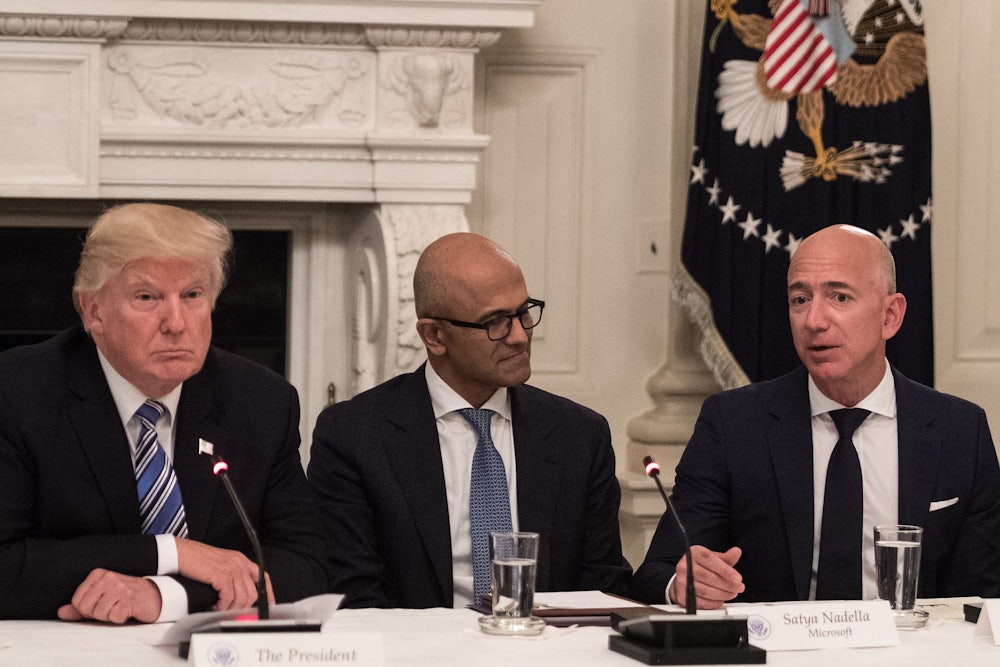President Donald Trump loves touting the success of the stock market under his watch, but this week he seems to have deliberately tried to sink the fortune of one company. On Wednesday, Axios reported that Trump is “obsessed” with Amazon and has contemplated using antitrust laws to break up the online retailer. While Trump’s hostility toward Amazon is long-standing, the Axios article caused Amazon shares to fall by almost 5 percent within hours. Trump seems to have regarded that as a victory, so he followed up with a tweet Thursday morning:
I have stated my concerns with Amazon long before the Election. Unlike others, they pay little or no taxes to state & local governments, use our Postal System as their Delivery Boy (causing tremendous loss to the U.S.), and are putting many thousands of retailers out of business!
— Donald J. Trump (@realDonaldTrump) March 29, 2018
Trump’s reasons for hating Amazon are personal. Amazon CEO Jeff Bezos is also the owner of The Washington Post, a newspaper often critical of the president. In fact, Trump has a tendency to conflate the two companies. “Almost too obvious to say, but Trump’s Amazon-bashing has always been inseparable from his media-bashing,” Toronto Star reporter Daniel Dale tweeted. “The president is going after the owner of a newspaper that aggressively investigates him.” As a former real-estate magnate, Trump also seems to have an instinctive dislike for an internet service that is hurting brick-and-mortar retailing.
The prospect of an American president going after a private business out of personal pique is alarming, yet American conservatives, the normal defenders of big business, have been surprisingly silent. This is all the more striking since they were so vocal in criticizing Trump’s predecessor for allegedly meddling in the economy by favoring some firms over others. In 2012, Mitt Romney complained that Barack Obama was “practicing crony capitalism. And if you want to get America going again, you’ve got to stop the spread of crony capitalism.” Four years later, Romney’s running mate, Paul Ryan, made a similar complaint: “Elites in Washington should NOT be picking winners & losers—that’s a recipe for a closed economy—for cronyism.”
Yet, with a few exceptions, like The Weekly Standard’s Charlie Sykes, there has been a reluctance on the political right to apply the same criticism to Trump. “Conservatives, I think, ought to be really alarmed by the precedence set here,” Sykes said on the Daily Standard podcast:
Here you have the potential of the kind of crony capitalism or the abuse of power where the president or others in power in the federal government pick and choose the winners and losers. They decide: ‘We’re going to reward you; we’re going to punish you. If in fact you engage in criticism of the administration, we’re prepared to vindictively go after you.’ Of all the groups in American society that ought to be most concerned about that kind of abuse of government power, I would think that free-market conservatives should be at the top of the list, but I’m frankly not going to hold my breath there.
Sykes is accurate in noting that his complaint won’t be widely echoed by his erstwhile ideological allies. As New York Magazine’s Jonathan Chait noted, Republicans have learned to love crony capitalism under Trump, with many GOP officials openly adopting policies to promote specific industries. Trump’s earlier attacks on companies like Boeing, for example, have been similarly indulged.
Yet, though the Republican shift is partly a matter of partisan politics, there are also other factors at work. In an age when Facebook is under attack for selling user data, the political tide is turning against Silicon Valley as a whole. Amazon then is a convenient scapegoat for the larger bipartisan ire against digital capitalism. Indeed, even some liberals agree with Trump’s complaints about Amazon.
For some Republicans, standing by while Trump goes after Amazon might just be the perfect safety valve for releasing their own public anger at Silicon Valley. The recent attacks have the added benefit that Trump’s bark is almost certainly worse than his bite. As Washington Post columnist Paul Waldman notes, Trump has few mechanisms for actually punishing Amazon, especially since his political appointees are averse to regulating business.
“[T]argeting a corporation would take some time and planning,” Waldman observes. “How would you go about it? In Amazon’s case, you could pursue some kind of antitrust case, but then you’d have to involve the Justice Department, which oversees such actions. I’m 99.99 percent sure that if you asked Trump who his assistant attorney general for antitrust is, he wouldn’t be able to tell you.”
It’s true that Trump’s Twitter tirades can have a short-term effect on the stock market. But the evidence suggests that this effect isn’t long-lasting, and most companies rebound. It’s true Trump is practicing a kind of crony capitalism, but as with so much of his administration, there’s a large element of theater to it. For Republican politicians, this might be the best of both worlds. Trump’s attacks on individual companies offer a kind of psychic release for generalized anger at big digital business, but with the benefit that the president’s tirades don’t really have an effect on capitalism itself. In the meantime, the business class can enjoy Trump’s actual policies: tax cuts and deregulation.
